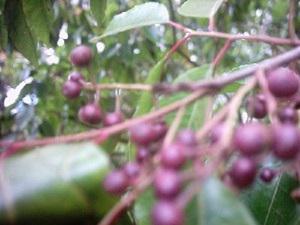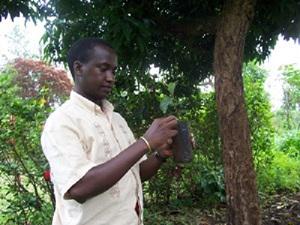Dino Andrew
Other projects
To improve domestication of Prunus africana through evaluation of early tree growth performance and introduction of more effective propagation methods.

Prunus africana berries on a tree.
Prunus africana is a tree species endemic to mountainous areas of Africa and listed in the IUCN red list database and Appendix II of The Convention on International Trade on Endangered Species (CITES). It is a commercial species whose bark is exported to Europe and USA for manufacture of drugs to cure prostate cancer disorders common to men of >50 years old. Recent scientific recommendation encourages domestication of the tree by farmers as best ways to rescue it from dangers of extinction.

Demonstration of how to remove plastic seedling pot during transplantation.
The first Rufford Grant (2004/5) with the aim to educate, create awareness and initiate planting campaigns for the species in farmers’ home gardens had impacts which exceeded the intended target. The target was to educate around 100 farmers and distribute 4000 Prunus seedlings, but more than 1000 farmers wanted to be involved. However, there was a problem of poor seedling performance at nursery level. This second grant application to Rufford has three main aims to:
(1) deliver appropriate nursery and silvicultural techniques to farmers;
(2) monitor and evaluate early growth performance of Prunus;
(3) create and enhance linkages between the farmers raising Prunus and those who have not started so as to have a wider impact.
In a broad sense the project will impart a long lasting knowledge and awareness to farmers on the need for conservation and sustainable utilization of biodiversity resources through proper income generating activities (win-win scenario). Many farmers in Tanzania rely on bioeconomy i.e. direct dependency in bioresources for livelihood. Enabling them to wisely use valuable bioresources is an innovation of substantial and long lasting contribution to nature conservation.
In this project, farmers who have adopted domestication of Prunus will get more nursery and silvicultural knowledge for management of the tree. Moreover this innovation will spread to a wider community for conservation and sustainable trading to succeed. This continuation project will contribute to the spread through linking farmers from two to three more villages to learn from farmers who participated in the first project. Monitoring and evaluation of the progress of activities initiated in the previous project is useful for feedback and improvement of the project towards sustainability.